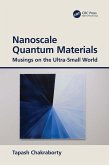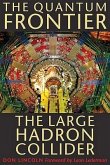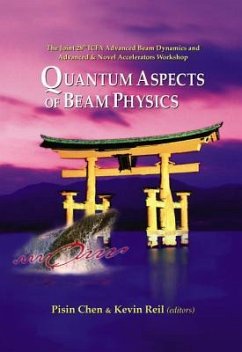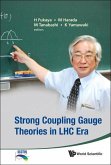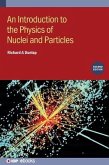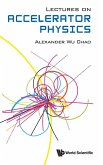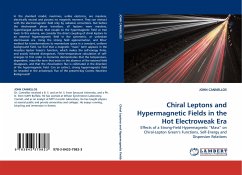Applications of Accelerators in the Quantum Technology Era
Herausgeber: Jamieson, David; Schleife, André; Bettiol, Andrew Anthony
Applications of Accelerators in the Quantum Technology Era
Herausgeber: Jamieson, David; Schleife, André; Bettiol, Andrew Anthony
- Gebundenes Buch
- Merkliste
- Auf die Merkliste
- Bewerten Bewerten
- Teilen
- Produkt teilen
- Produkterinnerung
- Produkterinnerung
This book explores new experimental techniques and theoretical models to deepen an understanding of radiation effects and ion interaction processes in order to design materials for devices for the emerging quantum technology era.
Andere Kunden interessierten sich auch für
![Nanoscale Quantum Materials Nanoscale Quantum Materials]() Tapash ChakrabortyNanoscale Quantum Materials116,99 €
Tapash ChakrabortyNanoscale Quantum Materials116,99 €![The Quantum Frontier The Quantum Frontier]() Don LincolnThe Quantum Frontier31,99 €
Don LincolnThe Quantum Frontier31,99 €![Quantum Aspects of Beam Physics 2003 - Proceedings of the Joint 28th Icfa Advanced Beam Dynamics & Advanced & Novel Accelerators Workshop Quantum Aspects of Beam Physics 2003 - Proceedings of the Joint 28th Icfa Advanced Beam Dynamics & Advanced & Novel Accelerators Workshop]() Quantum Aspects of Beam Physics 2003 - Proceedings of the Joint 28th Icfa Advanced Beam Dynamics & Advanced & Novel Accelerators Workshop206,99 €
Quantum Aspects of Beam Physics 2003 - Proceedings of the Joint 28th Icfa Advanced Beam Dynamics & Advanced & Novel Accelerators Workshop206,99 €![Strong Coupling Gauge Theories in Lhc Era - Proceedings of the Workshop in Honor of Toshihide Maskawa's 70th Birthday and 35th Anniversary of Dynamical Symmetry Breaking in Scgt Strong Coupling Gauge Theories in Lhc Era - Proceedings of the Workshop in Honor of Toshihide Maskawa's 70th Birthday and 35th Anniversary of Dynamical Symmetry Breaking in Scgt]() Strong Coupling Gauge Theories in Lhc Era - Proceedings of the Workshop in Honor of Toshihide Maskawa's 70th Birthday and 35th Anniversary of Dynamical Symmetry Breaking in Scgt152,99 €
Strong Coupling Gauge Theories in Lhc Era - Proceedings of the Workshop in Honor of Toshihide Maskawa's 70th Birthday and 35th Anniversary of Dynamical Symmetry Breaking in Scgt152,99 €![An Introduction to the Physics of Nuclei and Particles (Second Edition) An Introduction to the Physics of Nuclei and Particles (Second Edition)]() Richard A DunlapAn Introduction to the Physics of Nuclei and Particles (Second Edition)114,99 €
Richard A DunlapAn Introduction to the Physics of Nuclei and Particles (Second Edition)114,99 €![LECTURES ON ACCELERATOR PHYSICS LECTURES ON ACCELERATOR PHYSICS]() Alexander Wu ChaoLECTURES ON ACCELERATOR PHYSICS266,99 €
Alexander Wu ChaoLECTURES ON ACCELERATOR PHYSICS266,99 €![Chiral Leptons and Hypermagnetic Fields in the Hot Electroweak Era Chiral Leptons and Hypermagnetic Fields in the Hot Electroweak Era]() JOHN CANNELLOSChiral Leptons and Hypermagnetic Fields in the Hot Electroweak Era38,99 €
JOHN CANNELLOSChiral Leptons and Hypermagnetic Fields in the Hot Electroweak Era38,99 €-
-
-
This book explores new experimental techniques and theoretical models to deepen an understanding of radiation effects and ion interaction processes in order to design materials for devices for the emerging quantum technology era.
Produktdetails
- Produktdetails
- Verlag: Taylor & Francis Ltd (Sales)
- Seitenzahl: 162
- Erscheinungstermin: 13. November 2024
- Englisch
- Abmessung: 237mm x 165mm x 17mm
- Gewicht: 405g
- ISBN-13: 9781032310589
- ISBN-10: 1032310588
- Artikelnr.: 70770782
- Herstellerkennzeichnung
- Libri GmbH
- Europaallee 1
- 36244 Bad Hersfeld
- gpsr@libri.de
- Verlag: Taylor & Francis Ltd (Sales)
- Seitenzahl: 162
- Erscheinungstermin: 13. November 2024
- Englisch
- Abmessung: 237mm x 165mm x 17mm
- Gewicht: 405g
- ISBN-13: 9781032310589
- ISBN-10: 1032310588
- Artikelnr.: 70770782
- Herstellerkennzeichnung
- Libri GmbH
- Europaallee 1
- 36244 Bad Hersfeld
- gpsr@libri.de
David Jamieson is a Professor of Physics at the University of Melbourne. He served as President of the Australian Institute of Physics from 2005 to 2006 and is a Fellow of the AIP and the Institute of Physics UK. From 2008 to 2013, he served as the Head of the School of Physics at the University of Melbourne. His research expertise in the field of ion beam physics was applied to test some of the key functions of a revolutionary quantum computer constructed in silicon at the Australian Research Centre of Excellence for Quantum Computation and Communication Technology where he is a chief investigator and programme manager. Andrew Anthony Bettiol is an Associate Professor at the National University of Singapore. He is a principal investigator at the Centre for Ion Beam Applications (CIBA), Singapore, a multi-disciplinary research centre aimed at developing new technologies based on fast protons and ions, and simultaneously undertaking research into novel applications where proton or ion-based technologies provide a unique cutting edge. His current research explores nuclear microscopy in addition to the ion beam modification of materials - modifying optical, electrical, and magnetic properties of materials including bulk materials, semiconductors, non-linear optical materials and 2D materials. André Schleife is an Associate Professor at the University of Illinois Urbana-Champaign, United States. His research focus on computational material science and electronic and accelerated materials. He received the 2023 Dean's Award for Excellence in Research. His group uses advanced computation to understand and predict this intricate interplay for materials in electronic and energy applications and under extreme conditions. They study electronic excitations, triggered by interaction with electromagnetic and particle radiation, and subsequent femto-second relaxation processes.
Chapter 1: Introduction to Ion Beams and Quantum Technology. Chapter 2:
Predictive Simulations of Electronic and Atomic Phenomena of Particle
Radiation. Chapter 3: Introduction to Single Ion Techniques with Focused
Ion Beams. Chapter 4: Quantum Communication and Sensing Based on Colour
Centers in Wide-Bandgap Semiconductors. Chapter 5: Applications of Ion
Irradiation for Thin-Film Oxides. Chapter 6: Single Implanted Ions for
Qubits: Technology and Applications. Chapter 7: Dynamics of Radiation
Effects in Silicon Studied with Pulsed Ion Beams and Ion Beam Induced
Charge Collection.
Predictive Simulations of Electronic and Atomic Phenomena of Particle
Radiation. Chapter 3: Introduction to Single Ion Techniques with Focused
Ion Beams. Chapter 4: Quantum Communication and Sensing Based on Colour
Centers in Wide-Bandgap Semiconductors. Chapter 5: Applications of Ion
Irradiation for Thin-Film Oxides. Chapter 6: Single Implanted Ions for
Qubits: Technology and Applications. Chapter 7: Dynamics of Radiation
Effects in Silicon Studied with Pulsed Ion Beams and Ion Beam Induced
Charge Collection.
Chapter 1: Introduction to Ion Beams and Quantum Technology. Chapter 2:
Predictive Simulations of Electronic and Atomic Phenomena of Particle
Radiation. Chapter 3: Introduction to Single Ion Techniques with Focused
Ion Beams. Chapter 4: Quantum Communication and Sensing Based on Colour
Centers in Wide-Bandgap Semiconductors. Chapter 5: Applications of Ion
Irradiation for Thin-Film Oxides. Chapter 6: Single Implanted Ions for
Qubits: Technology and Applications. Chapter 7: Dynamics of Radiation
Effects in Silicon Studied with Pulsed Ion Beams and Ion Beam Induced
Charge Collection.
Predictive Simulations of Electronic and Atomic Phenomena of Particle
Radiation. Chapter 3: Introduction to Single Ion Techniques with Focused
Ion Beams. Chapter 4: Quantum Communication and Sensing Based on Colour
Centers in Wide-Bandgap Semiconductors. Chapter 5: Applications of Ion
Irradiation for Thin-Film Oxides. Chapter 6: Single Implanted Ions for
Qubits: Technology and Applications. Chapter 7: Dynamics of Radiation
Effects in Silicon Studied with Pulsed Ion Beams and Ion Beam Induced
Charge Collection.



